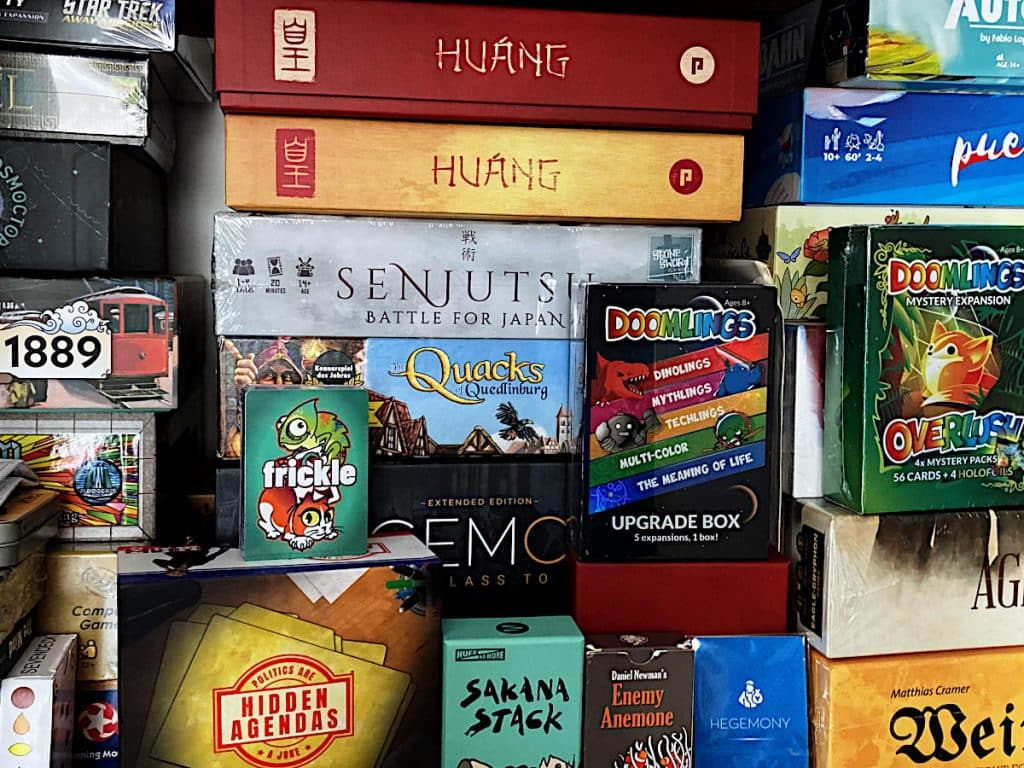The term Kulturgut is very hard to translate into English. In fact, I don’t think there is a similar concept in the UK. “Cultural asset” doesn’t really do it justice, because the term describes things that have a cultural value and need to be preserved. Literature is a type of Kulturgut for example. As a British person, you can easily see how the works of Shakespeare have a cultural value and require to be preserved. Yet, when it comes to our hobby, people don’t necessarily think of modern board games as Kulturgut. In this article, I want to look at this a little closer.
Listen to the Audio Version
Intro Music: Bomber (Sting) by Riot (https://www.
Music: The Coil Winds by Blue Dot Sessions
So while many of us can see that classic games such as Ludo or Monopoly have a cultural value and deserve to be preserved, it is very hard to think of something like Brass: Birmingham or Sky Team being considered in the same way.
Spiel des Jahres
Yet in Germany, the Spiel des Jahres association is trying to do exactly that. All right, the association isn’t talking about specific games as Kulturgut, but they do want the hobby as a whole to be seen as something of cultural importance that should be protected. The starting point is that hobby games aren’t just for children. Some modern games cover important real-life issues. They aren’t just for parents to play with their kids. Instead, they allow us all to tackle serious topics in a safe space and often in a way that can also be fun.
I must say, I agree with Spiel des Jahres. The modern board game hobby is very much like literature. Games cover a wide range of interests and subject matters. They can help us better understand certain topics and explore ideas and emotions. I think modern hobby games should be a type of Kulturgut.

Get yourself a wooden Tabletop Games Blog dice tray.
Each tray is the perfect size to roll your dice, and with the soft mat, it’s really quiet, while the wooden frame makes it wonderfully sturdy.
Just look at this year’s winner of the Kennerspiel prize for example. e-Mission, the German title of the game many of us will know as Daybreak, is a cooperative game where we try and save the world together. Players take the role of countries or global regions and try to achieve their individual goals while also helping others to work towards the shared goal of averting the threat of global warming. It’s a very serious topic packaged into a game that allows everyone around the table to discuss the issue and find out more by scanning QR codes printed on the cards and other game materials. The game heavily relied on the help of expert scientists in the field to ensure it emulates reality as closely as possible within the constraints of being a game that people play.

Social Comment
To be considered Kulturgut, games don’t have to deal with real-world issues though. Like other forms of art, many games are a comment on our society. They can reflect the thinking of their time. Just like books and films can be social commentary, so can board games.
A look back over previous Spiel des Jahres winners gives you a very good insight into the society of the time for example. Artwork, components, mechanisms as well as themes and settings are often influenced by the fashions and fads of the era. Sagaland, the winner from 1982, shows a fascination with fantasy and a desire to escape from the Cold War politics of the day, while the gameplay of the 1992 winner, Um Reifenbreite, reflects the increasing popularity of the Tour de France and other bicycle racing events and the game’s artwork has a unique cartoon style popular in those days.
Even if you don’t know these games yourself, you can probably relate to them and think of similar games that were popular in the United Kingdom around the same time. Alternatively, think of a game such as Dungeons & Dragons which became hugely popular here in the 1970s.
All of these games are now classics. Their age alone makes them worth considering as Kulturgut. However, I would argue that their cultural value is not purely based on how old they are. How they reflect the fashions of the time and how people dealt with real-world issues gives them cultural significance and makes them worthy of being preserved.
Not Every Game…

Of course, I’m not saying that every game should be classified as Kulturgut, but I would say that every year new games come out that deserve this status. Even if that wasn’t the case, the hobby as a whole has grown so much and has so much variety now that it has an intrinsic cultural importance. The way people in the hobby come together and share experiences, enjoy each other’s company and play games together has in itself cultural value. The hobby as a whole is a slice of our culture. It represents society and the games that are published or played are a reflection of the time.
Of course, just as reading books or watching films isn’t worthy of Kulturgut status, so isn’t playing games. Yet, in the same way as literature is culturally important and needs to be protected, I think the board game hobby is too. It deserves recognition and support. It needs a voice that can speak on its behalf and promote its status in our culture.
I think that’s starting to happen. While the hobby is much more prominent in the mainstream in Germany, it’s getting there in the United Kingdom too. Board games are talked about in a serious context, as well as in a social context. More and more people are discovering the hobby. More and more games are sold each year. The trend is, generally speaking, up.
How About You?
I have put forward my case. Now I want to know what you think. Do you think board games have a culturally important status? Does the hobby deserve recognition and protection? Should modern board games become Kulturgut? As always, please share your thoughts and discussion points in the comments below. I’d love to hear what you think.
For behind-the-scenes updates, branded merchandise, and more, please support the blog.
Useful Links
- Spiel des Jahres: https://www.
spiel-des-jahres. de/ en/ - Brass: Birmingham review: https://tabletopgamesblog.
com/ 2023/ 04/ 01/ brass-birmingham-deluxe-saturday-review/ - e-Mission: https://www.
spiel-des-jahres. de/ en/ games/ e-mission-daybreak/ - Sagaland: https://www.
spiel-des-jahres. de/ spiel-des-jahres-1982-sagaland/ - Um Reifenbreite: https://www.
spiel-des-jahres. de/ spiel-des-jahres-1992-um-reifenbreite-von-rob-bontenbal/ - Dungeons & Dragons: https://dnd.
wizards. com/ start-playing-dnd
Audio Version
Intro Music: Bomber (Sting) by Riot (https://www.
Music: The Coil Winds by Blue Dot Sessions
Playlist
These are the songs I listened to while I was writing this topic discussion article:

